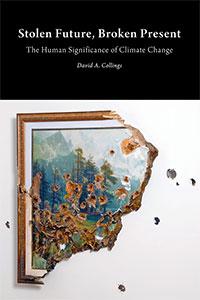
Stolen Future, Broken Present. Cover.
Stolen Future, Broken Present. Cover.
© 2007 Valerie Hegarty
 This work is licensed under a Creative Commons Attribution-ShareAlike 4.0 International License.
This work is licensed under a Creative Commons Attribution-ShareAlike 4.0 International License.
Collings, David A. Stolen Future, Broken Present: The Human Significance of Climate Change. London: Open Humanities Press, 2014.
This book argues that climate change has a devastating effect on how we think about the future. Once several positive feedback loops in Earth’s dynamic systems, such as the melting of the Arctic icecap or the drying of the Amazon, cross the point of no return, the biosphere is likely to undergo severe and irreversible warming.
Nearly everything we do is premised on the assumption that the world we know will endure into the future and provide a sustaining context for our activities. But today the future of a viable biosphere, and thus the purpose of our present activities, is put into question. A disappearing future leads to a broken present, a strange incoherence in the feel of everyday life.
We thus face the unprecedented challenge of salvaging a basis for our lives today. That basis, this book argues, may be found in our capacity to assume an infinite responsibility for ecological disaster and, like the biblical Job, to respond with awe to the alien voice that speaks from the whirlwind. By owning disaster and accepting our small place within the inhuman forces of the biosphere, we may discover how to live with responsibility and serenity whatever may come. (Text from Open Humanities Press)
© David A. Collings, 2014. This book is licensed CC BY-SA 4.0.
The Critical Climate Change series addresses the current sense of depletion, decay, mutation, and exhaustion which calls for new modes of address, new styles of publishing and authoring, and new formats and speeds of distribution. Edited by Tom Cohen and Claire Colebrook, the series aims to publish, in a timely fashion, experimental monographs that redefine the boundaries of disciplinary fields, rhetorical invasions, the interface of conceptual and scientific languages, and geomorphic and geopolitical interventions.

